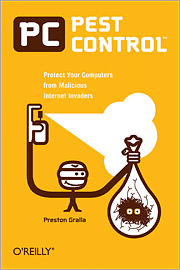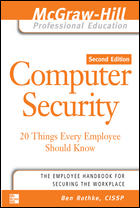 |
|
Michael
L'Estrange
Computer
Information
Science |
|
|
CISS 300: Introduction to
Information Systems Security
online class
| Instructor: |
Michael L'Estrange |
| Instructor
Email: |
lestram@arc.losrios.edu |
| Instructor
Web Page: |
http://ic.arc.losrios.edu/~lestram |
| Instructor
Phone: |
(916)-484-8147 |
| CSIT Area FAX: |
916-484-8673 (always include a
cover sheet) |
| Instructor
Office: |
ARC main campus, Liberal Arts Bldg.
Room 133, Office # 17 |
| Office hours: |
Mon Wed 5-6pm in room Liberal Arts 125
Tues Thur 11:30am-12:30pm
Saturday 7am-8am Online |
| Course Code #: |
26407
|
| Class Location: |
Online. |
| Meeting Times: |
TBA |
| Semester: |
Spring 2010 |
| Term: |
First Eight Weeks |
| Online Class
Start/End |
January 16 - March15 |
| First meeting: |
Orientation: The
orientation for this class will be online. |
| Final
Examination: |
Taken no later than 15 March 2009
|
| Prerequisite: |
None. |
| Advisory: |
CISC 320 (Operating
Systems), 350 (Introduction to Data Communications),
and 351 (Introduction to Local Area Networks) |
| Accepted for
credit: |
None. |
| Hours: |
18 hours lecture, 18 hours
laboratory. |
| Units: |
1 |
Important Notice!
This online class, like all other ARC online classes, requires the same
amount of work (reading, lab assignments, quizzes, projects and
examinations) as an on-campus class. The only difference is the
delivery method (online versus classroom lecture).
Orientation:
The orientation for this class will be conducted online. Please see
Instructor's home page.
Course Description
This course provides an
introduction to network-based and
Internet-based security applications and standards. Topics include
encryption, security protocols, network security applications, digital
signatures, protecting computers and the network from viruses, Trojans,
spyware, unsolicited E-mail and public and private key exchange.
Learning Outcomes and Course Objectives
Upon completion of this course, the student will be able to:
- Differentiate the various aspects of internal Local Area
Network (LAN) and Internet security.
- Analyze the potential effects of network intruders and
viruses.
- Compare Pretty Good Privacy (PGP) and Secure Multimedia
Internet Mail Extensions (S/MIME) for use in electronic mail security.
- Examine the use and importance of firewalls.
- Analyze the use and function of cryptography,
authentication, and digital signatures in network security.
- Assess the current information on TCP/IP security.
- Evaluate potential network security problems.
Textbook and Supplies

PC Pest Control
Preston Gralla, 2005, O'Reilly, 0-596-00926-7

Computer
Security: 20 Things Every Employee Should Know
Ben Rothke, 2nd, 2006, McGraw-Hill Osborne, 0072262826
Required:
- All students are required to obtain and maintain an ARC iMail
system email account.
- All students are required to have some form of portable
electronic storage media or device to save Homework files to.
- All students are required to obtain and maintain a Moodle
shell account.
Presentation
of Class
Materials:
The course will cover the required assignments in the texts, and some
outside assignments. The information will be introduced by
means
of lecture and classroom demonstrations. Students may be
given
assignments to be completed both in class as well as on their own
time. Lab work with a Windows PC will be required, and can be
completed on campus.
Moodle learning management system (LMS)
This class will be using the Moodle LMS, NOT D2L.
http://www.someprofs.org/moodle/
Moodle
will be used to access to all class materials, assignments, activities,
quizzes, examinations, and grades.
Special note on contacting the instructor for online students
The preferred method of contact is email.
The instructor is an offline resource, and he will probably not return
any messages over the weekend or college vacation days.
Emails that are undecipherable will be ignored. Use standard English in
all messages sent to the instructor.
Emails that do not contain a question may not be replied to. A question
should be denoted with a question mark, i.e.?!
Messages with long or complex questions may take time to answer, as in
several days.
The instructor will not open emails or attachments he cannot identify,
i.e. use your ARC Los Rios iMail email account.
No student emails are deleted.
A logbook of phone calls and faxes is maintained for each class.
Course Policies:
This class will adhere to as closely as possible all ARC and Los Rios
guidelines set forth in the catalog and/or the schedule of classes.
A document of general course policies for all my classes can be found
on the instructor's web site.
Labs
Almost all CIS classes require labs. It is the online student's
responsibility to complete the lab. Students may complete lab
assignments in CSIT Area Computer Labs, room 152, or at another ARC
computer lab facility if allowed.
Lab assignments must be completed by the assigned date. Under no
circumstances will network, system, hardware, or any other problems of
such nature be considered an excuse for turning in late work.
Lab
hours/Assistance:
Students may utilize lab time and assistance on campus in the CSIT area
computer lab room 152. Check
with the CSIT area lab personnel in room 152 for availability. Lab
assistance is not tutoring. Tutoring is available on campus; contact
the instructor directly
regarding tutoring.
Special Note on Cheating for Online
Independent Work Policy: Labs, Projects, Task, Assignments and Exams
are designed to measure the progress of individual
students. Collaborative work in groups of two or more is
prohibited unless the instructions specifically state otherwise.
A student must not copy another student’s work or import work
from another student. Do not allow another student to copy your
work. Your work must be independent - Failure to work independently
will result in all violators’ grades being reduced to zero for
that lab, project, task, assignment or exam. Second offense of
this policy will be referred to the Area Dean for administrative
action.
Online Testing Privilege: Participation in online examinations is
a privilege. When a student submits a lab, project, task,
assignment, or exam that appears to violate the independent work policy
the instructor retains the right to revoke the online exam privilege
and direct the student to the American River College Computer Science
Lab 152 for on-site testing.
Accommodations
It is critical that every student be provided an environment which is
conducive to learning. Please contact the professor if you have any
physical or learning disability or other need which might require a
special accommodation.
VMware Player / MS Windows XP Pro
Completion of the exercises and projects required for this
class requires access to a computer loaded with the Windows
XP
Pro Operating
System.
To complete lab assignments, students may use the ARC CSIT
Area Computer Lab, Room 152. It is not necessary to purchase a new copy
of
Windows XP Pro to use on your own home computer. However, Students may
find
using a product such as VMware workstation or the free VMware Player
will allow them to complete
assignments without damaging their home computer. Feel free to ask the
instructor more about VMware.
Online Discussions
During the semester you may be required to participate in online
discussions or forums. The purpose of these discussions is to stimulate
your thinking about the material covered in the course. Points will be
given based upon your level of participation in a discussion. Students
must provide their own ideas, reactions, opinions, or answers related
to the discussion topic or question or to the responses provided by
other students. The more thoughtful and detailed the student's
responses, the grater number of points he or she will earn. Abusive
remarks or attacks against others will not be tolerated and will result
in lost points. Online discussions must be completed by the assigned
date. No make-ups of discussions will be allowed.
Attendance Policy
Attendance will be monitored.
Attendance Requirements: ARC attendance policy for a traditional class
states: Students can be dropped from the course if his/her absences
equal one more than the number of times a class meets in a week. For
Online and Hybrid courses the submission of weekly assignments and
communications with the instructor will be used as the measurement of
attendance. Students that fail to submit assignments (or any
communication, e.g., email or voice mail) for two (2) consecutive
weeks, may be dropped from the class.
Once a student has been dropped form
the class (for whatever reason), he or she will not be reinstated.
Drops: Students unable to complete the course are responsible for
notifying the Records Office of their withdrawal. Failure to
formally drop the course will result in a final grade of 'F'.
If you have extenuating circumstances
which prevent you from participating in the class or submitting your
assignments, CONTACT THE PROFESSOR
IMMEDIATELY!
Online Schedule
This online class is not self-paced.
Students must complete readings and assignments based upon the class
schedule listed within the course. Success in this online class is
dependent upon reading the text, regular participation in discussions
and completion of the assigned work. Information will be presented in
supplemental materials and during discussions that is not included in
the text. Students will be tested on the material presented in the
text. Usually all assignments must be completed by the end of the week,
and it is up to the students discretion when to complete the
assignments that week.
If you have extenuating circumstances
which prevent you from participating in the class or submitting your
assignments, CONTACT THE PROFESSOR
IMMEDIATELY!
Course Lesson Plan / Schedule of Topics
This course will follow the book essentially in chapter order. The
schedule of topics, chapters to be covered,
and assignments due each week shall be listed in the Moodle LMS.
Students
may certainly read ahead, but completion of assignments early will not
be allowed or even be possible. Changes to the details of this
course schedule most likely will not be reflected on this web page. For
online classes, please refer to the Learning management System, Moodle,
for all current updates. For in person classes, the instructor will
make
announcements during lecture.
| CISS 300: Introduction to Information Systems
Security Course Lesson Plan |
| Week of: |
Topics |
Assignment |
January 16
|
- Orientation
- Logging on to ARC student lab computers
- Using ARC student iMail email
- Proper logout of the PC
- Introduction and current state of computer security.
|
- Read Chapter 1 & 2
- Email instructor using ARC iMail email
- Log into Moodle
- Orientation activities
|
January 23
|
- Review of software that can protect you against
viruses,
Trojans, cookies, malware, spyware and various other types of network
attacks
- Exploiting a system, defining an "exploit".
- Prevention of common system exploits.
- Firewalls!
|
- Read Chapter 3 & 4
- Quiz #1
|
| January 30 |
- Browsers
- Define "session hijacking": spoofing versus hacking
and the types of session hacking.
- Other Types of Attacks: cookie exploits, sniffing,
and "man-in-the-middle" attacks.
|
|
February 6
|
- Adware, spyware
- Steps for gathering information on computers over a
network.
- Define "IP spoofing". Purpose, types of spoofing,
possible outcomes.
- Denial of Service (DoS) Attacks, how they are done
and how to prevent.
|
- Read Chapter 6
- Midterm
Exam
|
| February 13 |
- Viruses, Trojans and bots
- Review of backdoors, rootkits and Trojans.
- Buffer overflows and how they work
- The importance of strong passwords.
- Windows password cracker programs and how they work.
- Unix password crackers, and where and how Unix
passwords are stored.
|
- Read Chapter 7 & Appendix
- Read: Computer Security: 20 Things Every Employee Should
Know
- Quiz #3
|
| February 20 |
- Email, worms and instant messaging
- Spam
- cryptography (encryption), authentication, and digital
signatures, public and private key exchange.
- electronic mail security: Pretty Good Privacy (PGP) and
Secure Multimedia Internet Mail Extensions (S/MIME)
|
- Read Chapter 8 & 9
- Quiz #4
|
| February 27 |
- Protecting your identity and kids online
- Review of ways hackers can cover their tracks.
|
|
March 6
|
- Wireless home networking dangers
- Final Exam
|
- Read Chapter 11
- NO Assignments accepted after the final
|
Homework/Projects/Lab Assignments and Discussion due dates will be
specified in the learning management system.
Documents
turned-in:
When turning in work in hard copy or electronic form, please
include a
header
on the top of the page with the following information:
Your Name Assignment #
CISS 300 Page # of #
Also, when contacting the instructor via email, be sure to include the
class number in the subject line, i.e. CISS 300.
Evaluation and Grading
The grade in this course will be determined by student
performance
in each of the following areas, and weighted as described in the
following charts.
| Grade Assessment Weighting |
Attendance/ Discussion Participation
|
(24 points) 6% |
Quizzes
|
(126 points) 31.5% |
Homework/Projects/Lab Assignments
|
(150 points) 37.5% |
| Final Examination |
(100 points) 25% |
| Grade Assignment by Total Points |
| Points Obtained |
Total % |
Grade
Assigned |
| 360+ |
90% |
A |
| 320+ |
80% |
B |
| 280+ |
70% |
C |
| 240+ |
60% |
D |
less than 239
|
below 60% |
F |
Extra Credit Work
There will be no extra credit work
given in this class. A student’s grade is based solely upon the
regularly assigned work in the class and upon the quizzes and
examinations given in the class.
Grades Available Online
Grades will never be sent out by
email.
Most grades for individual assignments will be available during the
semester through
the learning management system used for the class.
At the end of the semester, final grades will only be accessible
through the
ARC eServices system.
Policy on Late Work and Makeup Exams
No late work will be accepted.
No make up quizzes or exams will be given.
NO Assignments accepted after the final
Caveat
The professor reserves the right to change any of the details of this
course syllabus or the course schedule with a minimum of advance notice
Passing the Course
- Students must take the Final exam to pass.
- Students must pass the Final exam with a D grade or
better.
- Students must take the Final exam on the scheduled date
and time
of the Final. (You have 8 weeks to clear you schedule - make it so.)
Last Updated: 19 December 2009



